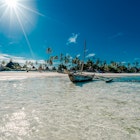
"I had to start a travel company to travel." Meet the woman making tourism more inclusive and accessible

Dec 3, 2021 ÔÇó 6 min read

Planet Abled founder Neha Arora (center) with two travelers at one of the company's early trips to Agra ┬® Courtesy of Planet Abled
On tours put on by India-based Planet Abled, people with various disabilities and those without disabilities travel side by side.
When Neha Arora launched almost five years ago, she was possibly the worldÔÇÖs least-traveled owner of a travel company. Besides a few weekend getaways in her native India, she had never ventured far from home.
As a child, Arora, now 37, watched as her classmates in Agra went on family vacations and came home with stories of their escapades. Her outings were limited to school picnics or trips to see her grandparents in New Delhi. Family getaways never seemed like a real option. AroraÔÇÖs father is blind and her mother uses a wheelchair: the logistical challenges of travel always felt insurmountable.

From frustration to inspiration
When AroraÔÇÖs first passport expired, it was still blank. After finishing her engineering degree, Arora moved to New Delhi and began working at a telecommunications company. Eventually she saved enough money for her family to take a 10-day trip through South India in 2009. Money, she hoped, might overcome the travel barriers her parents faced. She was wrong.
"You travel 2000 miles only to realize that the place is not accessible or does not give you the kind of experience you would look forward to,ÔÇØ Arora said.
After a particularly difficult incident on that South India trip, when an argument over accessibility escalated into a dangerous situation, her parents gave up on travel and Arora started searching for solutions. There were travel companies that catered to people with disabilities, but most of them focused on a single disability. Arora couldnÔÇÖt find anything that would allow her to travel comfortably and safely with both of her parents.
ÔÇ£I started talking to more and more people, and either they were not traveling at all or they were facing similar challenges,ÔÇØ she said. ÔÇ£I had to start a travel company to travel.ÔÇØ
Accessibility as inclusivity
Over ÔÇô about 15% of the worldÔÇÖs population ÔÇô live with some form of disability, according to the World Health Organization, from mobility and cognitive issues to being visually or hearing impaired. In addition,, including spouses, children and caregivers, are directly affected by disability.
Despite this, accessible tourism, wherein everyone can take full advantage of travel facilities and services regardless of their physical limitations, disabilities, or age, isnÔÇÖt the norm. Travel remains difficult for many people with disabilities, be it from a lack of information on accessible services, discrimination, or trouble finding accommodation that meets their needs. One that even in countries with the highest level of adaptation ÔÇôgenerally countries with the highest per capita income ÔÇôwheelchair accessibility is provided in only 30% of the hotels analyzed and accommodations such as Braille, tactile posters or audio guides are offered in 5% or less of cases.

Although Arora saw this gap early on, it wasnÔÇÖt until 2016 that she felt ready to leave her job to start Planet Abled, with the goal of making travel more accessible for people of all disabilities. Initially, Planet Abled provided day trips in New Delhi, but it has since expanded to offer accessible group tours and customized trips in over 40 destinations across Europe and Asia. What makes Planet Abled unique is that their experiences are inclusive. ÔÇ£We mix people with various disabilities and nondisabled people to travel together,ÔÇØ Arora said. ÔÇ£So disability is just a human feature ÔÇô it's not something that decides how you travel or where you travel.ÔÇØ
It can be tricky to consider adaptations for different disabilities, but Arora says Planet AbledÔÇÖs approach leads to some unexpected surprises. On one trip, a blind man created software to communicate with a deaf woman instead of relying on a third person. On another tour, a nondisabled tourist told Arora that though theyÔÇÖd been to that place four times before, they now saw it in a whole new light. This isnÔÇÖt uncommon, Arora says. Taking a longer route because of wheelchair access or focusing on the tactile experience because of a blind traveler in the group, for instance, can help travelers zero in on details they might otherwise miss.

Making accessibility mainstream
People in Planet AbledÔÇÖs groups have also stayed friends after the trips. ÔÇ£You realize, ÔÇÿOh, this person is just like me and they just happen to have a disability,ÔÇÖÔÇØ Arora said, adding that sometimes nondisabled travelers will approach the company after their trips with questions about how to make their workplaces more accessible or how to hire a person with a disability.
, a senior lecturer at Royal Holloway, University of London, discovered Planet Abled in 2019 when planning a fieldwork trip to India. Since it was her first time in the country, she reached out to the group about joining a day trip.
ÔÇ£I did not want to use just any travel company. I am blind and therefore the usual way of sightseeing doesnÔÇÖt really work,ÔÇØ said Zeyen, who travels frequently for work and leisure. ÔÇ£I need people to describe things to me, be allowed to touch things and helped to navigate unfamiliar places.ÔÇØ

On a 12-hour tour through Delhi with Planet Abled, Zeyen says her guide was well-trained in describing what Zeyen couldnÔÇÖt see without being patronizing, something she says is unfortunately rare. He let her choose if she wanted to be sight guided (led by the arm) or walk next to him with her cane. She could also touch some of the monuments and Planet Abled printed 3-D models for some of the objects she couldnÔÇÖt touch to give a sense of their proportion and shape.
ÔÇ£At one point near the spice market in Old Delhi, we climbed up this narrow staircase to stand on one of the roofs to absorb the atmosphere,ÔÇØ Zeyen said. ÔÇ£I like that Planet Abled sees me as just another traveler who wants to explore the world, but who might just have to do things slightly differently.ÔÇØ
Arora now has multiple stamps in her passport, the first from 2018 when she visited Vienna, Austria, to accept an award from the United Nations for Planet AbledÔÇÖs work. She has also expanded Planet AbledÔÇÖs scope, consulting with governments, tourism boards, hotels, NGOs, and others, to provide advice on how to make travel more inclusive and accessible.

Just the beginning
Arora says the industry has changed for the better since Planet Abled began. Back then, she says, when she approached hotels about accessibility issues they often blew her off, claiming that people with disabilities donÔÇÖt travel. Now when she talks to hotel chains, they listen. ÔÇ£At least now there is reception to the message that this is the right thing to do.ÔÇØ
A found that the disability travel market is growing. In 2018-19, more than 27 million travelers with disabilities took 81 million trips, spending $58.7 billion on travel (up from $34.6 billion in 2015). The economic impact is likely even bigger, since people with disabilities often travel with others.
Planet Abled is building a platform to make its information about accessibility more widely available so people can plan their own trips and donÔÇÖt need to rely on travel operators, which can be expensive. In the end, Arora says the aim is to have every travel company and destination be accessible, paradoxically making Planet AbledÔÇÖs work irrelevant.
ÔÇ£Ultimately ÔÇô this might sound ironic ÔÇô you don't need a separate travel company for disabled people,ÔÇØ Arora said. ÔÇ£You want the whole industry to become inclusive and thatÔÇÖs what the goal of Planet Abled is: to make the planet able and inclusive for everyone to travel.ÔÇØ
You might also like:
The world's most wheelchair-accessible travel destinations
6 of the best national parks for persons with disabilities
This London Museum might be the most accessible in the world
Explore related stories

Activities
Accessible Hawaii: the best things to do for travelers with disabilities and additional needsFeb 7, 2022 ÔÇó 7 min read




 Destination PracticalitiesThereÔÇÖs something fun in every season in the Florida Keys
Destination PracticalitiesThereÔÇÖs something fun in every season in the Florida KeysDec 21, 2024 ÔÇó 3 min read




